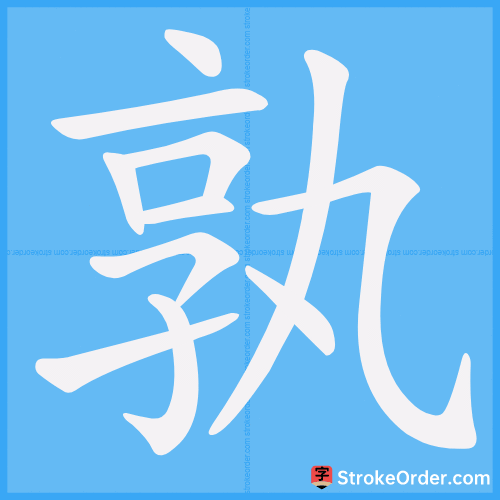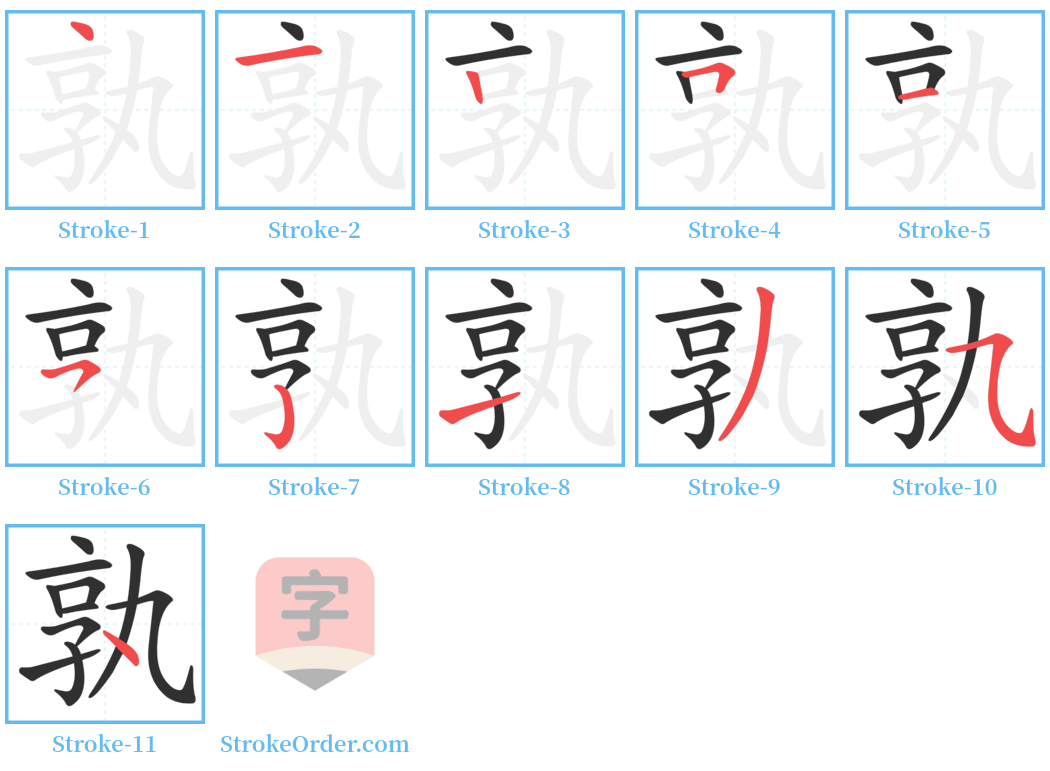孰 Stroke Order
Animated Stroke Order of 孰

Stroke Order Diagrams for 孰

Step-by-Step Handwriting Guide for 孰

Learn to Write Chinese Characters with Video Tutorials
Watch the video of writing the Chinese character "孰", learn the correct stroke order (笔顺) of the character "孰", and master the standard way of writing the character "孰".
Free Printable Handwriting Practice with Stroke Order: 孰
Printable Writing Practice Worksheet of "孰" in Portrait Orientation (Tian Zi Ge)

Printable Writing Practice Worksheet of "孰" in Landscape Orientation (Tian Zi Ge)

Information of 孰
Pinyin
shú
Radical
子
Strokes
11 strokes
Usage
★★★★
Definition
who / which / what
孰 [shú]
1. Who, which.
谁,哪个:孰是孰非。
2. What.
什么:是可忍,孰不可忍?
3. Used in rhetorical questions indicating choice, with a sense of comparison.
用在表示抉择的反问语句中,有比较的意思:孰与,孰若,孰何。
4. Same as “熟” in ancient usage, meaning deep or thorough.
古同“熟”,程度深。
---
孰 [shú]
Verb
Original meaning: Cooked, well-done.
同本义:“熟”的古字 ([En.] cooked)
1. Same as the original meaning.
同本义。“熟”的古字 ([En.] cooked)
2. Used to indicate ripeness.
通“熟”。成熟 ([En.] ripe)
3. Abundant crops; harvest of grains.
庄稼丰收;五谷有收成 ([En.] harvest)
---
孰 [shú]
Adjective
Same as “熟.” Detailed, meticulous, thorough.
通“熟”。缜密,仔细,周详 ([En.] careful)
---
孰 [shú]
Pronoun
1. Who, which person or people.
谁,哪个人或哪些人 ([En.] who)
2. Which one or ones, among a group.
一组中的哪一个或哪几个 ([En.] which)
3. What.
什么 ([En.] what)
---
孰 [shú]
Verb
Original meaning: Cooked, well-done.
同本义:“熟”的古字 ([En.] cooked)
引:
1. “说文”: 孰,食饪也。字亦作熟。
2. “左传·宣公二年”: 宰夫胹熊蹯不孰。
Example:
又如: 孰烂
2. Used to signify ripeness.
通“熟”。成熟 ([En.] ripe)
引:
1. “荀子·富国”: 寒暑和节,而五谷以时孰。
2. “礼记·礼运”: 腥其俎,孰其俎。
3. “礼记·乐记”: 五谷时孰。
4. “汉书·董仲舒传”: 群生而万民殖,五谷孰而草木茂。
3. Abundant crops; harvest of grains.
庄稼丰收;五谷有收成 ([En.] harvest)
引:
1. “墨子”: 夫妇节而天地和,风雨节而五谷孰,衣服节而肌肤和。
---
孰 [shú]
Adjective
Same as “熟.” Detailed, meticulous, thorough.
通“熟”。缜密,仔细,周详 ([En.] careful)
引:
1. “商君书·更法”: 臣恐天下之议君,愿孰察之。
2. “荀子·不苟”: 兼权之,孰计之。
3. “礼记·内则”: 宁孰谏。
4. “荀子·议兵”: 凡虑事欲孰。注:“谓精审。”
5. “周髀算经”: 思之未孰。
6. “史记·廉颇蔺相如列传”: 唯大王与群臣孰计议之。
7. “战国策·齐策”: 明日,徐公来,孰视之,自以为不如。
Example:
又如: 孰复(反复思虑); 孰虑(计虑周祥); 孰视(细看); 孰计(考虑缜密周到); 孰论(仔细辨析); 孰察(仔细观察)
---
孰 [shú]
Pronoun
1. Who, which person or people.
谁,哪个人或哪些人 ([En.] who)
引:
1. “论语”: 孰不可忍也。
2. 唐· 韩愈《师说》: 人非生而行之者,孰能无惑?
3. 唐· 柳宗元《捕蛇者说》: 孰知赋敛之毒有甚是蛇者乎!
Example:
又如: 孰能当之; 孰胜孰负; 孰何(谁何); 孰与(与谁); 孰谁(何人)
2. Which one or ones, among a group.
一组中的哪一个或哪几个 ([En.] which)
引:
1. “战国策·齐策”: 吾与徐公孰美?
2. “三国志·诸葛亮传”: 百姓孰敢不箪食壶浆以迎将军者乎?
Example:
又如: 孰是孰非
3. What.
什么 ([En.] what)
引:
1. “国语·越语”: 与其杀是人也,宁可得此国也,甚孰利乎?
2. 唐· 柳宗元《封建论》: 孰明之,由封建而明之也。
Input Method for 孰
Pinyin
shu2
Wubi
ybvy
Cangjie
ydkni
Zhengma
sjqs
Four Corner
05417
Unicode
U+5b70
Same Pronunciation Characters